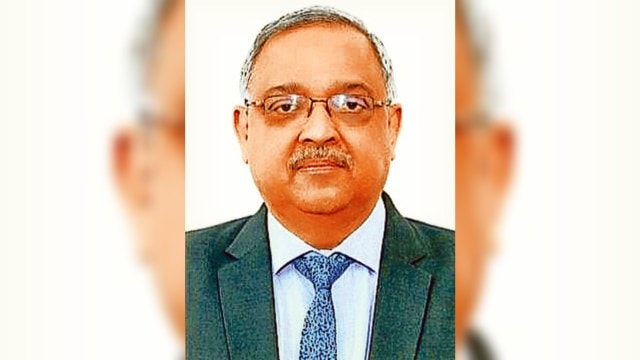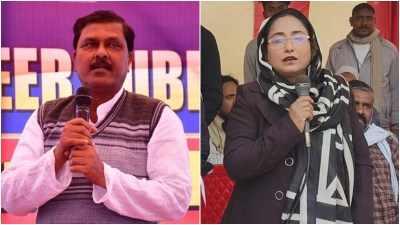‘Those courageous to take risks are often most successful’: Who is Justice K Vinod Chandran, set to take oath as Supreme Court judge today
Justice Chandran, the Chief Justice of Patna High Court was recommended by the Supreme Court Collegium for appointment as SC judge and will have a tenure of over three years and is set to retire on April 24, 2028.
 During his tenure as Chief Justice, the Patna HC introduced several e-Initiatives, including the e-Indian Law Report (Patna Series) to allow access to Supreme Court and Patna HC judgments in English and Hindi.
During his tenure as Chief Justice, the Patna HC introduced several e-Initiatives, including the e-Indian Law Report (Patna Series) to allow access to Supreme Court and Patna HC judgments in English and Hindi.Justice K Vinod Chandran is set to take oath as judge of the Supreme Court on Thursday.
With his appointment, the Supreme Court will have 33 judges, just one short of its full strength of 34, until January 31 when Justice Hrishikesh Roy will be retiring. Justices Abhay S Oka, Sudhanshu Dhulia and Bela M Trivedi are also set to retire in 2025.
Justice Chandran, the Chief Justice of Patna High Court was recommended by the Supreme Court Collegium for appointment as SC judge on July 7. He will have a tenure of over three years and is set to retire on April 24, 2028.
Born in Paravur in Ernakulam district in 1963, Justice Chandran did not begin his career in law but graduated from Christian College in Ernakulam’s Aluva and took up a job with the State Bank of Travancore and was briefly posted in Kochi. During his stint at the bank, he enrolled as a law student at the Kerala Law Academy in Kochi and subsequently quit his job to practice at the Kerala High Court.
When he was elevated to the HC as a judge, Justice Chandran had said that many had questioned his “burning of bridges” when he quit his secure, salaried job for a legal practice. He had said that “those who are courageous to take risks are often the most successful”.
As a lawyer, Justice Chandran was primarily a tax lawyer and as a Special Government Pleader (Taxes) between 2007 and 2011 for the government of Kerala. His efforts in tackling the backlog of tax cases was noticed by the Collegium which led to his appointment as a judge of the Kerala High Court on November 8, 2011. For the next decade and change, Justice Chandran served as a judge of the Kerala High Court until he was appointed as the Chief Justice of the Patna HC in 2023.
While serving as a judge in Kerala High Court in 2013, Justice Chandran had even walked out of the court expressing his displeasure about the unpreparedness of the government pleaders in presenting the state government cases. He had then held that the conduct of the government pleaders was hampering the justice system and delaying justice to those who had approached the court.
In 2015, Justice Chandran had ruled in favour of two Muslim girls who wanted to wear hijab and full-sleeve dress while appearing for the CBSE All-India Pre-Medical Entrance Test. He then held “it was not proper for any authority to deny a woman the right to wear her religious attire. If a particular dress is mandated by a religion, it cannot be insisted that such a dress be avoided for an examination”.
In 2021, a division bench comprising Justice Chandran had again came out against the ineptitude of the prosecutors in several cases, which resulted in offenders escaping. His bench had then initiated a suo motu case to look into the appointment of government prosecutors.
Justice Chandran delivered several immensely significant judgments during his tenure as a High Court judge. In 2023, a bench led by Justice Chandran heard the challenge to the Bihar government’s initiative to conduct a caste-based survey, where petitioners argued that it was effectively a caste census that could only be conducted by the Centre.
Though the court had briefly stayed the survey in May, in August 2023, a bench comprising Justices Chandran and Partha Sarathy allowed the survey to go ahead. It held that the caste survey was a valid exercise of state power to identify backward classes for upliftment, and stated that “the State Governments cannot wait on their haunches for the Central Government to carry out the census and provide it with the details so as to ensure affirmative action within the State”. A challenge to this decision is now pending before the SC.
In a connected matter, the same bench decided on August 21, 2023, that transgender persons should not be included as a separate caste as a part of the caste survey. The court accepted the argument that including transgender persons as a caste category would “effectively disentitle the transgender persons from the right to choose their gender identity”.
Justice Chandran also authored a judgment upholding the validity of the Bihar Private Schools (Fee Regulation) Act, 2019. In the same decision, the court set aside challenges to a letter from the State Education Department barring private schools from increasing their fees by more than 7% from the previous academic year. Private schools argued that there were no guidelines to consider requests from private schools regarding the determination of fees and that the 7% limit was arbitrary. The court upheld the Act and the 7% cap on fee increases, stating that it is “aimed at ensuring that education is not commercialised and reduced to mere means of profiteering”.
During his tenure as Chief Justice, the Patna HC also introduced several e-Initiatives, including the e-Indian Law Report (Patna Series) to allow access to Supreme Court and Patna HC judgments in English and Hindi.







